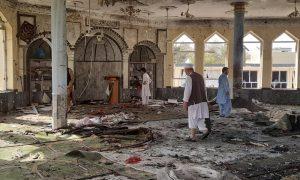
Umm Muhammed Umar
Last Friday saw yet another fatal blast in a masjid in Kunduz, Afghanistan, with more than 20 people having lost their lives. Radio Islam spoke to Brother Bismillah Pashtun, who was in Zabul Province.
Pashtun said it was unfortunate that such an incident had taken place during the holy month of Ramadhaan. He said that it had begun by a Pakistani air strike in Khost Province, when a camp for the internally displaced was hit from the skies by the Pakistan military. He said that dozens, including at least 2o children had been killed in the attack. The incident, according to Pashtun, was followed by a suicide attack at Mazar-i-Sharif, which also saw several casualties and fatalities. He said, “The same happened in Kabul schools, in education centres.” He added that the latest incident, which took place last Friday, after the Friday prayer, at around 2pm, members of a Sufi group were engaged in prayer when the explosion took place.
Pashtun said that according to the statement of a survivor, at least 33 people, including some children were killed, with nearly 40 injured. He added, however, that hospital sources, as well as local people, said that there were up to 100 victims, between the dead and the injured. According to Pashtun, social media videos showed that ISIS in Herat province were celebrating the attack. He added, “But there are no any official claims in the government, in security forces, (they) have not blamed anyone.”
While these incidents had taken place before the Taliban took power, and ISIS had been present in the country then, as well, it seemed that they were increasing in frequency. Pashtun said that it was not that the Taliban could not manage the security situation in Afghanistan, but that there were many actors involved in its deterioration. He said, “The first is that as the Taliban took control of the country, many groups were created and announced their opposition against the Taliban. These started military-like activities in the east and north of the country, sometimes attacking Taliban posts, and at other times, attacking civilian and soft targets like mosques, and schools, and markets.” Pashtun added, “The second is that the Taliban government has some conflicts with neighbouring countries, including Pakistan. Sometimes the border police clashed with (those of) other country’s like Iran, Pakistan, Tajikistan, which also impacts on (the) security situation.” Pashtun asserted that those countries were directly or indirectly supporting some of the groups who were carrying out attacks inside Afghanistan. Unemployment and economic problems, had forced some people, according to Pashtun, to join some groups who pay them for terrorist activities.
Pashtun expressed the concerns of ordinary Afghans that if the Taliban government, or their international supporters, did not control the situation, then once Ramadhaan had ended, the situation would become even worse.







0 Comments